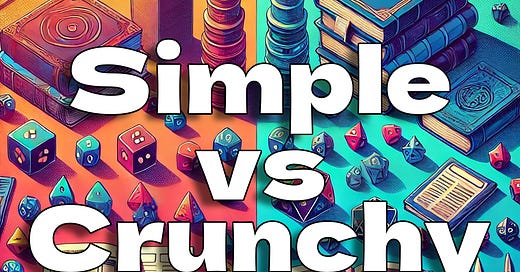Are Simple RPGs Just a Fad, or Is Crunch Gone for Good? (with Video)
Okay, let’s cut to the chase—RPGs have changed a lot over the years. Back in the day, we had these monstrous, rule-packed games that could double as doorstops.
You know the ones I’m talking about—Palladium Fantasy, Rolemaster, Traveler. You needed a PhD just to create a character! KIDDING, well maybe! But these days, it seems like the tables have turned (pun intended).
Look, I get it. Not everyone wants to spend their whole evening arguing over which table to roll on when a goblin sneezes. Enter Troika, Mothership, Mork Borg, and other rules-light systems. These are the games that let you grab a couple of dice, a character sheet, and just jump right into the adventure. No fuss, no muss. It’s all about getting straight into the storytelling, making big, dramatic moves, and letting the dice decide the rest. It’s like fast food for your gaming cravings—quick, satisfying, and easy to digest.
And honestly, it makes sense why these systems are popular. They’re perfect for folks who want to play without drowning in a sea of rules and exceptions. Plus, they’re great for new players who don’t want to spend hours figuring out what “THAC0” means (and if you know what that is, congratulations, you’re officially an RPG historian).
But Some of Us Miss the Crunch!
Now, I know there are still plenty of you out there who miss the good ol’ days of rules-heavy RPGs. You love the crunch—the satisfying complexity that lets you tweak every stat, optimize every ability, and plan out a combat strategy like you’re running a military campaign. And yeah, I see the appeal. There’s a certain joy in mastering a complicated system, knowing every little rule and using it to your advantage. It’s like the difference between playing chess and playing checkers—both are fun, but one definitely makes you feel like a tactical genius.
Some games still keep that spirit alive, like Pathfinder or Eclipse Phase. They’re out there, quietly catering to those of us who enjoy having a rulebook the size of a small child.
So, What’s the Verdict? Will Crunch Make a Comeback?
Well, that’s the big question, isn’t it? Are these simpler games just a trend, or is the age of crunch really over? Honestly, I think it’s a bit of both. Players love variety. Today you might want to run a quick, narrative-heavy game of Mothership, but next week you’re itching for some deep, tactical combat in Rolemaster. The thing is, RPGs have always evolved, and they’ll keep evolving as long as we keep playing them.
Maybe we’ll see a return to complexity in the future, or maybe not. But at the end of the day, the best RPG is the one you’re having fun with—whether you’re rolling a single d6 or consulting a flowchart for how to land a punch.
Bottom Line: It’s All About the Fun
Whether you’re a rules-light storyteller or a crunch-loving number-cruncher, there’s room for you at the table. And who knows, maybe one day we’ll look back at this era of simplified games as just another chapter in the story of RPGs. So, what do you think? Is crunch dead, or just waiting for a comeback? Drop your thoughts in the comments—I'd love to hear from you.







The crunch from the 80s and 90s was just something else. I played Rolemaster recently on a VTT and I'm not sure how you could play that with our computer help. Encounter rounds must have literally taken hours to resolve.
Is crunch dead? No. It's a lot better designed now. Like others have said, 5E and Pathfinder are crunchy but in a more more intuitive way. Even some story first games like Blades in the Dark I consider crunchy (not mechanically but procedurally).
Not sure ‘the crunch’ ever went away. Palladium keeps on keeping on and D&D5e is…. what it is (and nothwithstanding the kerfuffle over whatever the new edition is called, it would be idle to pretend it doesn’t outsell virtually all other systems combined). Instead, the TTRPG space just got more diluted and some of that dilution featured more rules-lite systems. I actually think the biggest spur to the growth of lite mechanics is not community (sic) preference but the explosion of micro-publishers made possible by the wider availability of publishing software and distribution platforms. Most really small operators don’t have the time or budget to develop fat core rulebooks and so - by necessity - opt for simpler mechanics. Of course, this then feeds back into more people discovering such games and finding that they like (or, at least, can live with) lighter mechanics.
I started with A&D1e in the early to mid-1980s, began adopting a very discursive, narrative GMing style and chucking rules out almost immediately (don’t think I ever used the weapon vs armour type table) and, by the mid-1990s, was playing CoC, VtM and other mid-crunch systems alongside early editions of Ars Magica (crunchy as all get out, but a great setting and neat magic system) and entirely free-form systemless games. These days, my preference is for very light mechanics - I recently ran a mini-campaign of Cthulhu Dark and liked that a lot - but I’ll happily run and play in most systems comparable to BRP in complexity. Even then, most games I run feature a standing joke among the players that - to everyone’s surprise - dice were actually rolled at all in the session.